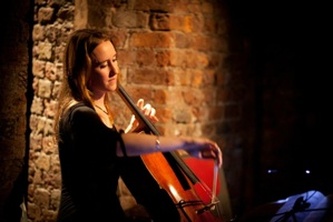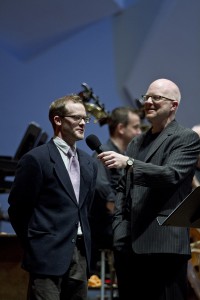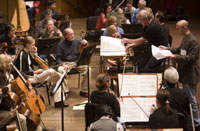Kate Ellis to Perform Dublin Premiere of the Chaconne for Cello and Electronic Music

Kate Ellis, co-artistic director of the Ireland-based Crash Ensemble, will perform Ciach's Chaconne for cello and electronic music in Dublin in the fall of 2012.
With an interest in contemporary music from her time at the Purcell School, Kate became Cellist with the Crash Ensemble in 2002 and has since joined a revolving cast of new music groups for various performances and recordings. With a passion for the unknown, and the chance meeting of various musical minds including Karan Casey, Gavin Friday, Tarab and Yurodny, Kate continues to tour and perform extensively throughout Ireland, Europe, the US and Australia.
Taking a more curatorial approach to her work, Kate is co-curator of the highly successful 'Kaleidoscope Night' and as musician in residence at the Cork opera House has been given a platform to perform and curate her own nights of music. More recently and to much excitement, Kate has been appointed co-artistic director of the Crash Ensemble.
Kate's performance (specific date TBA) will be the work's third performance. The premiere of the Chaconne was performed by Hyun-Jee Song at Indiana University. It was also performed at the 2009 Midwest Composers Symposium by Alice Corey at the University of Michigan.
With an interest in contemporary music from her time at the Purcell School, Kate became Cellist with the Crash Ensemble in 2002 and has since joined a revolving cast of new music groups for various performances and recordings. With a passion for the unknown, and the chance meeting of various musical minds including Karan Casey, Gavin Friday, Tarab and Yurodny, Kate continues to tour and perform extensively throughout Ireland, Europe, the US and Australia.
Taking a more curatorial approach to her work, Kate is co-curator of the highly successful 'Kaleidoscope Night' and as musician in residence at the Cork opera House has been given a platform to perform and curate her own nights of music. More recently and to much excitement, Kate has been appointed co-artistic director of the Crash Ensemble.
Kate's performance (specific date TBA) will be the work's third performance. The premiere of the Chaconne was performed by Hyun-Jee Song at Indiana University. It was also performed at the 2009 Midwest Composers Symposium by Alice Corey at the University of Michigan.
Subito Music Names Brian Ciach as Subito Composer Fellow

“Following the recent success of our new partnership with the Minnesota Orchestra Composer Institute, Subito Music Corporation is pleased to announce that Brian Ciach has been named our inaugural Subito Composer Fellow.”
"Brian Ciach (left) chats with host Fred Child (right) during the Minnesota Public Radio's January 6th live broadcast of the Minnesota Orchestra Composer Institute Future Classics concert." Photo: Greg Helgeson, courtesy: Minnesota Orchestra
“The Composer Institute,” notes Stephen Culbertson (Subito Music founder and CEO), “is a celebrated training program for young symphonic composers; and this year, it presented Brian’s work Collective Uncommon. Brian possesses a unique way of connecting with listeners through his use of orchestration and intense sonorities to create a visceral, musical montage. We created the Subito Composer Fellowship as a mentoring program so that composers could gain an in-depth understanding of the classical music publishing world. This isn’t generally part of the composition studies curriculum, and we look forward to working with Brian as he gains the insights and tools that relate the business of music to the art of creating music.” The Fellowship will provide professional promotional efforts for Ciach’s work, along with the opportunity for him to cultivate a practical knowledge of today’s publishing industry with on-site, hands-on training.
Collective Uncommon: Seven Orchestral Studies on Medical Oddities was inspired by Ciach’s visit to Philadelphia’s Mütter Museum, a medical oddities branch of The College of Physicians which was founded in 1787. “The Mütter Museum,” Ciach explains, “contains a host of specimens of various odd afflictions…[and it's] goal is to inspire research into the successful treatments and cures of various unusual disorders. I was fascinated by the collection and thought ‘What kind of piece would these relics inspire?’ I contacted museum personnel, who supported the project, but reminded me that the artifacts, as unusual and as macabre as they may seem, were once part of a living human being…[and] ‘there is a terrifying beauty in the spirits of those forced to endure these afflictions’. So I then set out to create a sensitive, chiaroscuro-balance between light and dark, macabre and humanitarian.” Written for Ciach’s doctoral dissertation at Indiana University, Collective Uncommon explores seven medical oddities using specific compositional genres. After its premiere, Bloomington Herald Times critic Peter Jacobi wrote, “Just listening brought moments of sheer excitement from how imaginatively the composer used his skills in orchestration to suggest chaos and furor, mystery and alarm, sympathy and wonder.”
“I am very excited and honored to have been selected for the first Subito Composer Fellowship! I am especially honored that Collective Uncommon has been selected out of the pool of works at the Institute–all equally worthy of this remarkable fellowship. The initiative of this program reflects Subito Music’s innovation and furthers the valuable mission of the Minnesota Orchestra Composer Institute. I look forward to learning and exploring much through this opportunity.” — Brian Ciach
A native of Philadelphia, Ciach (pronounced SIGH-ack) is an internationally performed composer. He also actively performs as a new music pianist and has recorded all of his piano works. In addition to his studies at Indiana University, he also attended Temple University and the Freie Universität Berlin. Ciach has taught at Indiana, Temple, and West Chester (PA) Universities, and is currently an Adjunct Instructor at Ball State University. He served on the piano faculty at Delaware County Community College, the Settlement Music School in Philadelphia, and at the Darlington Arts Center. Upcoming Ciach premieres include two commissioned works: Blank Slate for the Square Peg Round Hole percussion quartet, and The Einstein Slide (an appendix to Collective Uncommon) written for the contemporary group Alarm Will Sound who will premiere the work during the composer’s residency at the 2012 Mizzou New Music Summer Festival.
“Brian Ciach’s Collective Uncommon was one of the hits of this year’s Future Classics concert with the Minnesota Orchestra. I hear it as a 21st-century take on Sweeney Todd’s Pictures at an Exhibition. Brian’s music is quirky, wry and possessed with both good humor and a gleeful objectivity about the absurd. His work is beautifully scored, always clear and full of arresting sounds and images, held together by intuitive dramatic plans that draw the listener in.” — Aaron Jay Kernis, Minnesota Orchestra Composer Institute Founder and Artistic Director
"Brian Ciach (left) chats with host Fred Child (right) during the Minnesota Public Radio's January 6th live broadcast of the Minnesota Orchestra Composer Institute Future Classics concert." Photo: Greg Helgeson, courtesy: Minnesota Orchestra
“The Composer Institute,” notes Stephen Culbertson (Subito Music founder and CEO), “is a celebrated training program for young symphonic composers; and this year, it presented Brian’s work Collective Uncommon. Brian possesses a unique way of connecting with listeners through his use of orchestration and intense sonorities to create a visceral, musical montage. We created the Subito Composer Fellowship as a mentoring program so that composers could gain an in-depth understanding of the classical music publishing world. This isn’t generally part of the composition studies curriculum, and we look forward to working with Brian as he gains the insights and tools that relate the business of music to the art of creating music.” The Fellowship will provide professional promotional efforts for Ciach’s work, along with the opportunity for him to cultivate a practical knowledge of today’s publishing industry with on-site, hands-on training.
Collective Uncommon: Seven Orchestral Studies on Medical Oddities was inspired by Ciach’s visit to Philadelphia’s Mütter Museum, a medical oddities branch of The College of Physicians which was founded in 1787. “The Mütter Museum,” Ciach explains, “contains a host of specimens of various odd afflictions…[and it's] goal is to inspire research into the successful treatments and cures of various unusual disorders. I was fascinated by the collection and thought ‘What kind of piece would these relics inspire?’ I contacted museum personnel, who supported the project, but reminded me that the artifacts, as unusual and as macabre as they may seem, were once part of a living human being…[and] ‘there is a terrifying beauty in the spirits of those forced to endure these afflictions’. So I then set out to create a sensitive, chiaroscuro-balance between light and dark, macabre and humanitarian.” Written for Ciach’s doctoral dissertation at Indiana University, Collective Uncommon explores seven medical oddities using specific compositional genres. After its premiere, Bloomington Herald Times critic Peter Jacobi wrote, “Just listening brought moments of sheer excitement from how imaginatively the composer used his skills in orchestration to suggest chaos and furor, mystery and alarm, sympathy and wonder.”
“I am very excited and honored to have been selected for the first Subito Composer Fellowship! I am especially honored that Collective Uncommon has been selected out of the pool of works at the Institute–all equally worthy of this remarkable fellowship. The initiative of this program reflects Subito Music’s innovation and furthers the valuable mission of the Minnesota Orchestra Composer Institute. I look forward to learning and exploring much through this opportunity.” — Brian Ciach
A native of Philadelphia, Ciach (pronounced SIGH-ack) is an internationally performed composer. He also actively performs as a new music pianist and has recorded all of his piano works. In addition to his studies at Indiana University, he also attended Temple University and the Freie Universität Berlin. Ciach has taught at Indiana, Temple, and West Chester (PA) Universities, and is currently an Adjunct Instructor at Ball State University. He served on the piano faculty at Delaware County Community College, the Settlement Music School in Philadelphia, and at the Darlington Arts Center. Upcoming Ciach premieres include two commissioned works: Blank Slate for the Square Peg Round Hole percussion quartet, and The Einstein Slide (an appendix to Collective Uncommon) written for the contemporary group Alarm Will Sound who will premiere the work during the composer’s residency at the 2012 Mizzou New Music Summer Festival.
“Brian Ciach’s Collective Uncommon was one of the hits of this year’s Future Classics concert with the Minnesota Orchestra. I hear it as a 21st-century take on Sweeney Todd’s Pictures at an Exhibition. Brian’s music is quirky, wry and possessed with both good humor and a gleeful objectivity about the absurd. His work is beautifully scored, always clear and full of arresting sounds and images, held together by intuitive dramatic plans that draw the listener in.” — Aaron Jay Kernis, Minnesota Orchestra Composer Institute Founder and Artistic Director
Mizzou New Music Summer Festival: Ciach to write The Einstein Slide (2012) inspired by a slice of Einstein's brain found in a medical oddities museum in Philadelphia:
Commissioned work for percussion quartet Square Peg Round Hole to be performed this spring

The new work for percussion quartet, Blank Slate (2012), is comprised entirely of "found" instruments which include glass bottles, wine glasses, vegetables, sawing wood, and giant industrial-sized trash cans. The three-movement work features a three-minute miniature requiem for vegetable ocarinas.
Ciach's Collective Uncommon to be Performed at the Minnesota Orchestra Composer Institute

The Minnesota Orchestra Composer Institute, presented each season by the Minnesota Orchestra and American Composers Forum in cooperation with the American Music Center, provides the opportunity for up to nine composers from across the nation to participate in an intensive immersion into the world of a major American symphony orchestra.
The Composer Institute, which is unique in the nation, features orchestral rehearsals, a public performance, and numerous targeted workshops with leading music industry professionals on musical, career, business and professional development issues. The Institute nurtures the participants’ musical acumen and broadens their career management skills, assisting in their growth as artists and community leaders. Many participants have said that the Composer Institute was the single most important experience of their musical educations. Seminar topics include many not offered elsewhere, including advanced instrumental and orchestral writing, copyrights, commissioning, licensing, publishing, promotion, music preparation, public speaking, working with conductors and union orchestras, community residencies, CD and media production, and working in educational settings, among others.
The Institute is directed by Pulitzer Prize-winning composer Aaron Jay Kernis. Prior to and following the rehearsals and performance, composers receive feedback from Kernis, Minnesota Orchestra members, and Music Director Osmo Vänskä. There is no fee to the participating composers and many area composers who are members of the American Composers Forum audit the seminars free of charge.
The Composer Institute, which is unique in the nation, features orchestral rehearsals, a public performance, and numerous targeted workshops with leading music industry professionals on musical, career, business and professional development issues. The Institute nurtures the participants’ musical acumen and broadens their career management skills, assisting in their growth as artists and community leaders. Many participants have said that the Composer Institute was the single most important experience of their musical educations. Seminar topics include many not offered elsewhere, including advanced instrumental and orchestral writing, copyrights, commissioning, licensing, publishing, promotion, music preparation, public speaking, working with conductors and union orchestras, community residencies, CD and media production, and working in educational settings, among others.
The Institute is directed by Pulitzer Prize-winning composer Aaron Jay Kernis. Prior to and following the rehearsals and performance, composers receive feedback from Kernis, Minnesota Orchestra members, and Music Director Osmo Vänskä. There is no fee to the participating composers and many area composers who are members of the American Composers Forum audit the seminars free of charge.
